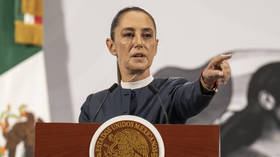Wholesale costs make record jump
Wholesale prices have risen a record amount over the past year – by 9.6% – according to new figures released by the US Labor Department on Tuesday, compounding the ongoing inflation crisis facing Americans.
The producer price index for final demand, which tracks the prices paid by domestic producers and suppliers, rose 0.8% in November and 0.6% in October. The current annual jump marks the highest on record since the Labor Department began collecting such data in 2010.
Excluding food, energy, and trade services, the producer price index still saw a 6.9% annual jump, leapfrogging the record set in 2014. The consumer price of goods such as gas and food has consequently risen across the nation, as has that for services such as hotel rooms and air travel.
The rise in prices charged by producers is only the latest sign that the current inflation crisis is not going anywhere anytime soon for Americans, who are enduring record inflation. Previous data from the Labor Department showed the consumer price index also saw a record annual rise in November, moving at its fastest pace since 1982.
The White House has chalked up the rising costs to the Covid-19 pandemic and the supply chain issues keeping companies from meeting increased market demand.
Federal Reserve Chairman Jerome Powell told a Senate committee last month that, though inflation had been described as “transitory” in previous communications, that word would likely no longer be used, as it didn’t accurately describe the US’ current cost issues.
“It carries a time – a sense of [being] short-lived,” Powell said. “We tend to use it to mean that it won’t leave a permanent mark in the form of higher inflation. I think it’s probably a good time to retire that word and try to explain clearly what we mean.”














